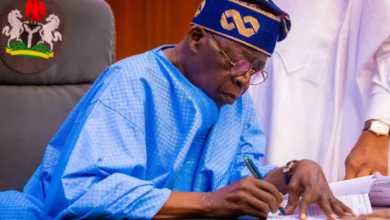
The Federal Government has deployed 10,000 personnel from the Nigeria Security and Civil Defence Corps (NSCDC) to tackle escalating attacks on oil pipelines in Rivers State, following a series of explosions at oil installations between Sunday and Tuesday.
NSCDC spokesperson, Afolabi Babawale, confirmed the deployment of anti-vandal operatives on Wednesday, emphasizing their responsibility to safeguard critical infrastructure and prevent further pipeline vandalism, particularly in the Niger Delta region.
“The NSCDC strongly warns against the destruction and vandalism of essential national assets and infrastructure across the Niger Delta. Over 10,000 operatives have been deployed to collaborate with other security agencies to ensure the security of lives and property,” Babawale stated.
This security escalation comes in the wake of President Bola Tinubu’s declaration of emergency rule in Rivers State, which has been met with fierce opposition. Opposition lawmakers and labor unions have protested against the move, arguing that the suspension of Governor Siminalayi Fubara, his deputy, and the state assembly members is unconstitutional.
In a national broadcast on Tuesday, President Tinubu announced the suspension of Governor Fubara, his deputy Prof Ngozi Odu, and members of the state’s assembly, citing the need to restore order in the state. He appointed Vice Admiral Ibok-Ette Ibas (retd.) as the sole administrator of Rivers State, who was sworn in at the Aso Villa on Wednesday. Ibas will lead the state for an initial period of six months.
The declaration of emergency rule followed a politically charged atmosphere in Rivers State, with three explosions reported within two days. The attacks were a direct response to threats from Ijaw groups, who vowed to disrupt oil production if the state legislature moved to impeach Fubara. The Martin Amaewhule-led Assembly had set the stage for impeachment by citing 19 alleged infractions by the governor.
One of the recent explosions occurred on Sunday at the Trans Niger Pipeline in Aluu, in the Ikwerre Local Government Area of Rivers. Security officials recovered a body at the blast site and arrested a suspect in connection with the attack. A staff member from Pipeline Infrastructure Nigeria Limited (PINL) said that the suspect was detained following credible intelligence from their covert team operating in Aluu.
Speaking about the deployment of the 10,000 NSCDC personnel, Babawale assured that the agency was on high alert across the country to protect Nigeria’s vital assets. “As the lead agency in the protection of critical national infrastructure, the NSCDC is working in close collaboration with other security agencies to prevent acts of economic sabotage, including pipeline vandalism,” he added.
Meanwhile, the political situation in Rivers State continues to unfold, with Governor Fubara having vacated the Government House in Port Harcourt. The whereabouts of the governor remain unclear, but reports suggest that the building is now heavily guarded by soldiers, with several Armoured Personnel Carriers stationed at the entrance.
As political tensions in the state intensify, the National Assembly has scheduled a debate on the legality of the emergency rule declared by President Tinubu. The Senate and House of Representatives have both postponed the debate, which is expected to be contentious, given the growing opposition from lawmakers.
The mood in the National Assembly was tense on Wednesday, with heated exchanges between female lawmakers over the constitutional validity of the President’s decision. Despite the friction, the House did not address the issue directly, with discussions on the President’s letter to the Assembly being deferred.
At the same time, Tinubu swore in Vice Admiral Ibas as the sole administrator of Rivers State. Ibas, a retired naval officer and former Chief of Naval Staff, promised to prioritize peace, security, and stability in the state. He acknowledged the volatile situation and emphasized the importance of restoring law and order as the foundation for governance.
Opposition groups, including the People’s Democratic Party (PDP) and labor unions, have expressed strong disapproval of the President’s actions, arguing that the suspension of elected officials undermines Nigeria’s democratic processes. PDP National Publicity Secretary Debo Ologunagba criticized Tinubu’s move as an overreach, stating that it violates constitutional provisions that guarantee the tenure of elected governors. He called on the National Assembly to challenge the President’s decision.
Similarly, former Bayelsa State Governor Seriake Dickson condemned the emergency rule, calling it a “power grab” and warning against setting a dangerous precedent. Several lawmakers, including Ikenga Ugochinyere, a representative from Imo State, also expressed concerns that the President’s actions resemble a military takeover, which could threaten Nigeria’s democracy.
Labor unions, including the Nigeria Labour Congress (NLC) and the Trade Union Congress (TUC), have joined the opposition in condemning the emergency rule as unconstitutional. NLC President Joe Ajaero and TUC President Festus Osifo described the move as a direct assault on democracy, warning that it could have far-reaching consequences for the rule of law in Nigeria.
Meanwhile, civil society organizations, including Amnesty International, have raised alarms over the suspension of democratic institutions in Rivers State, calling for the protection of human rights and the restoration of constitutional governance. Emmanuel Onwubiko of the Human Rights Writers Association likened the President’s actions to the military coups in other African countries and called for legal challenges to the emergency rule.
In response to the growing criticisms, Attorney-General of the Federation Lateef Fagbemi defended the President’s actions, calling the decision a necessary intervention to prevent the collapse of the state. Fagbemi emphasized that the President’s actions were a response to constitutional violations in Rivers, including the demolition of the state assembly and the failure of the governor to prevent pipeline vandalism.
He also highlighted the importance of safeguarding Nigeria’s oil infrastructure, stressing that the country’s reliance on crude oil makes any attack on pipelines a national security threat. The Attorney-General dismissed accusations that the Minister of the Federal Capital Territory, Nyesom Wike, had a hand in the crisis, pointing out that the responsibility for the situation lies with the governor and the state assembly.
As the situation continues to develop, the National Assembly’s decision on the legality of the emergency rule will be pivotal in determining the future political landscape of Rivers State and the broader implications for Nigerian democracy.





